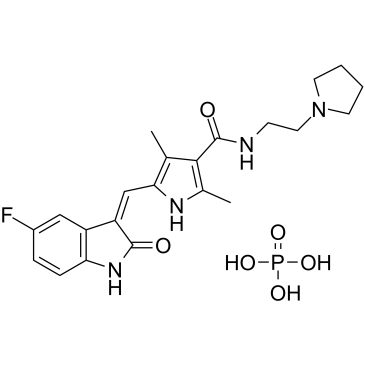Toceranib phosphate |
| Catalog No.GC37808 |
Toceranib phosphate (SU11654 phosphate) is an orally active receptor tyrosine kinase (RTK) inhibitor, and it potently inhibits PDGFR, VEGFR, and Kit with Kis of 5 and 6 nM for PDGFRβ and Flk-1/KDR, respectively. Toceranib phosphate (SU11654 phosphate) has antitumor and antiangiogenic activity, and used in the treatment of canine mast cell tumors .
Products are for research use only. Not for human use. We do not sell to patients.

Cas No.: 874819-74-6
Sample solution is provided at 25 µL, 10mM.
Toceranib phosphate is a multitargeted indolinone receptor tyrosine kinase (RTK) inhibitor with Kis of 5 and 6 nM for PDGFRβ and Flk-1/KDR, respectively. PDGFRβ|5 nM (Ki)|Flk-1|6 nM (Ki)
Toceranib (SU11654) is a selective inhibitor of the tyrosine kinase activity of several members of the split kinase RTK family, including PDGFR and Flk-1/KDR, with Kis of 5 and 6 nM, respectively[1]. To explore mechanisms of acquired Toceranib (TOC) resistance in canine MCT, three resistant sublines are generated from the Toceranib-sensitive exon 11 ITD c-kit mutant C2 cell line designated TR1, TR2, and TR3. Growth of the parental C2 cells is inhibited by Toceranib in a dose-dependent manner with an IC50 of 1,000 nM). Sensitivity to three other KIT RTK inhibitors is similar to the observed resistance to Toceranib. The parental line as well as all three sublines retains sensitivity to the cytotoxic agents vinblastine (VBL) and CCNU. Following 72 hr culture in the presence of increasing concentrations of Toceranib, treatment naÏve, parental C2 cells detach from the culture flask and become rounded, shrunken, and clumped with increased exposure to Toceranib. In contrast, Toceranib-induced morphologic differences are not identified in the resistant sublines[2].
Administration of Toceranib significantly decreases the number and percentage of Treg in the peripheral blood of dogs with cancer. Dogs receiving Toceranib and cyclophosphamide (CYC) demonstrate a significant increase in serum concentrations of IFN-γ, which is inversely correlated with Treg numbers after 6 weeks of combination treatment[3].
[1]. London CA, et al. Phase I dose-escalating study of SU11654, a small molecule receptor tyrosine kinase inhibitor, in dogs with spontaneous malignancies. Clin Cancer Res. 2003 Jul;9(7):2755-68. [2]. Halsey CH, et al. Development of an in vitro model of acquired resistance to toceranib phosphate (Palladia•) in canine mast cell tumor. BMC Vet Res. 2014 May 6;10:105. [3]. Mitchell L, et al. Clinical and immunomodulatory effects of toceranib combined with low-dose cyclophosphamide in dogs with cancer. J Vet Intern Med. 2012 Mar-Apr;26(2):355-62.
Average Rating: 5 (Based on Reviews and 18 reference(s) in Google Scholar.)
GLPBIO products are for RESEARCH USE ONLY. Please make sure your review or question is research based.
Required fields are marked with *




















